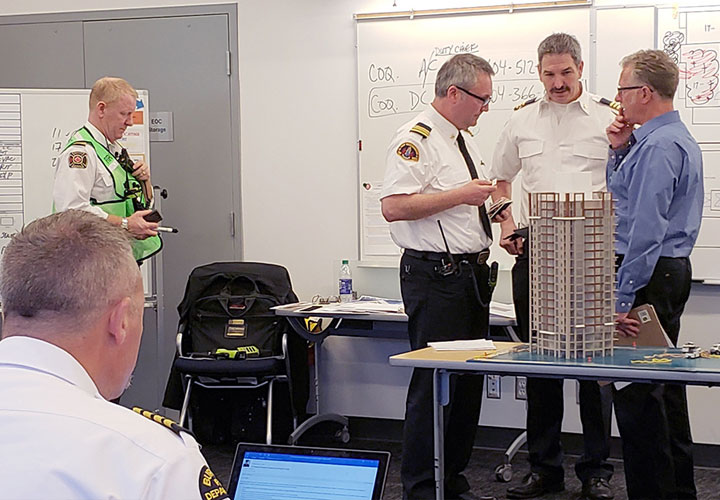emergency planning
E-Comm takes part in emergency planning for high-risk scenarios


Situations such as plane crashes, train derailments and high-rise building fires require a coordinated, multi-agency emergency response. That’s why E-Comm participated in three exercises in November to test how various emergency partners would react to such incidents.
Each exercise provided E-Comm an opportunity to collaborate and share ideas with emergency services partners and to show how E-Comm’s Wide-Area Radio Network would help police officers, firefighters and paramedics communicate with each other during a major incident.
Vancouver International Airport (YVR) kicked off its annual crisis scenario planning on November 14, with a hypothetical situation of a full aircraft forced to make an emergency landing and then becoming engulfed in flames on the runway. E-Comm joined close to 100 individuals from more than 30 government organizations and public safety agencies, including its dispatch partners Richmond RCMP and Richmond Fire-Rescue, to discuss
inter-agency priorities, joint-response efforts, emergency operations communication and coordination in the event of a crash at YVR.

“Over the years E-Comm has developed detailed emergency response plans, and tabletop exercises are a great opportunity not only to put our resources to the test, but to connect with professionals from other public safety agencies and share ideas,” said E-Comm Emergency Communications Centre Manager Marc McAdam, who participated in the exercise.
On November 20, E-Comm collaborated with Langley City Fire Rescue Service, Township of Langley Fire Department, Surrey Fire Service, the RCMP and BC Emergency Health Services to conduct a tabletop exercise with interoperability in mind. This theoretical scenario involved a vehicle and train collision that sparks a fire. Representatives from nearly three dozen organizations from all levels of emergency services and local government worked together to better understand how to optimize their responses and the importance of using E-Comm’s radio channels during major incidents.
Interoperability (the ability for first responders to talk to each other on radios) was also a key theme of the high-rise fire exercise on November 21. E-Comm joined six fire departments (Coquitlam Fire/Rescue, Port Moody Fire-Rescue, New Westminster Fire & Rescue Services, Delta Fire & Emergency Services, Port Coquitlam Fire & Emergency Services and Burnaby Fire Department) in a hypothetical scenario of a large-scale fire at the top of a high-rise building. This exercise focused on how fire crews from multiple departments would be dispatched and managed via E-Comm’s different radio channels. “Practicing how all agencies would respond to large-scale incidents is extremely valuable,” said Dave Mitchell, E-Comm’s director of Fire Services. “While such major incidents are rare, there’s massive value in understanding how every agency would coordinate how they would respond.”
More than 30 police, fire and ambulance agencies within Metro Vancouver and parts of the Fraser Valley are proudly communicating on E-Comm’s Wide-Area Radio Network, the largest multi-jurisdictional, tri-service emergency radio system in B.C.

